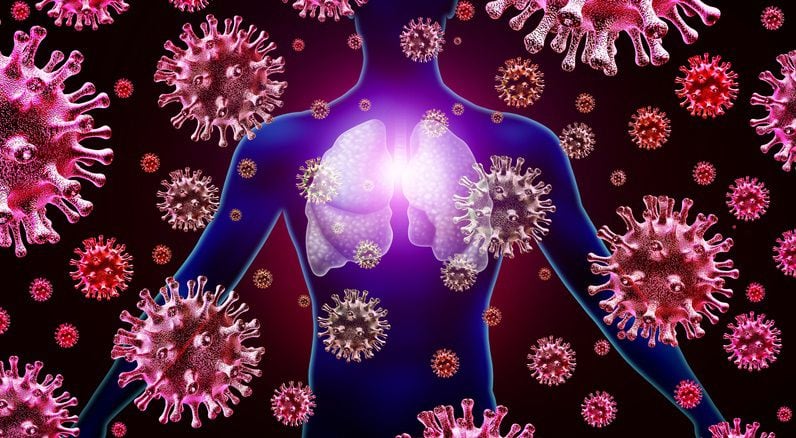
The flu is a contagious respiratory disease caused by influenza viruses that infect the nose, throat, and lungs. It is not a minor infection: in some people, it can become complicated and even fatal. This year the increase in circulation of the virus was advanced in Argentina. Since last December, there have been more cases of influenza A, with the subtype H3N2, and the Argentine Society of Infectology has already recommended that you need to get vaccinated as soon as possible. It's only one dose per year.
2022 is different from the previous two years. In 2020, when the coronavirus that causes COVID-19 began to circulate and there was a massive confinement in the country, cases of infections such as influenza and other respiratory viruses were significantly reduced. The flu almost didn't exist. But last year, as mobility through cities within and outside the country was restored, cases rose again.
As of December 2021, a progressive increase was detected in the number of cases of Influenza A, in particular the H3N2 subtype, with 794 confirmed cases reported as of February 10. From an epidemiological point of view, it was a circulation during a period of the year that was not usual for this respiratory virus. The influenza virus is generally expected to circulate during late autumn and winter (mainly between May and August) in Argentina.
But this year is different, and the board of directors of the Argentine Society of Infectious Diseases, chaired by physician Claudia Salgueira, considered that it is necessary to emphasize that the population in risk groups should approach the public vaccinations where the campaign of the Ministry of Health of the Nation has already started. If a person is not at risk, the dose can be applied in the social and prepaid work coverage system or in private vaccinations. The medical society provided 5 keys to keep in mind:
1- You have to get vaccinated against the flu

“It is often believed that the flu is a minor and unimportant infection. In addition, since coronavirus displaced the other respiratory viruses in 2020, there were not many cases recorded and that reduced the perception of the risk of influenza and its complications,” Dr. Salgueira told Infobae.
It is a highly contagious respiratory viral disease. Most of those affected recover in one to two weeks without needing medical treatment. However, influenza can cause serious complications, including death, in people 65 and older, young children, pregnant women, and people with chronic diseases or conditions, such as cardiovascular, respiratory, renal, immunosuppression, cancer, transplantation, obesity, and diabetes.
Pregnant people should receive the flu vaccine at any time during pregnancy. In the case of people who have recently given birth, they can receive the dose until discharge from maternity, with a maximum of 10 days, if they did not receive the vaccine during pregnancy.
2- All available vaccines are used against the circulating virus

There are different types of influenza viruses that are constantly changing. This means that the composition of the influenza vaccine changes every year depending on the predominant subtypes in the northern hemisphere, among other criteria. This year the circulation of Influenza A subtype H3N2 predominates.
“In Argentina, there are two types of vaccines this year. Both provide protection against influenza A virus subtype H3N2,” said Salgueira. They are two vaccines that differ only in that one is trivalent and the other is quadrivalent. In the case of trivalent, it is the one offered in the public system for the prioritized population, and protects against three strains of influenza: A H1N1, A H3N2 and influenza B Victoria lineage.
In contrast, in vaccinations and private pharmacies, a quadrivalent vaccine is available that protects against four strains of influenza: A H1N1, A H3N2 and influenza B lineages Victoria and Yamagata . “At the moment, no circulation of the Yamagata strain has been detected in Argentina,” the specialist clarified.
3- Flu symptoms can be confused with COVID-19
Although these are two different diseases caused by viruses, the symptoms of flu and COVID-19 are quite similar. Both infections can manifest with nasal congestion, fever, sore throat, body pain. One difference may be vomiting and diarrhea in the case of coronavirus infection.
Because some symptoms of influenza and COVID-19 are similar, people may need to be screened to find out which virus is causing the disease. It is also known that people can become infected with the flu virus and the virus it causes. COVID-19 at the same time, and may increase the risk of complications.
In the United States, from October 1, 2021 through March 19, 2022, 3.5% of patients hospitalized with influenza also tested positive for coronavirus, according to the Center for Disease Control and Prevention (CDC).
When faced with flu or COVID-19 symptoms, it is important to consult your doctor, according to the president of the SADI. “People in risk groups should pay attention to symptoms and consult. They can be tested to diagnose what infection it is. If it was the flu, within 48 hours they can access oseltamivir treatment early,” said Salgueira.
4- Influenza vaccines are effective and can be applied with others

Sometimes there are people who get vaccinated against the flu and then develop symptoms such as sore throat, nasal congestion, among others. “It is often believed that the flu vaccine is not effective when respiratory symptoms appear. But it's not right. Because there are other lesser-known viruses that can also affect people who have already been vaccinated against the flu and cause the same symptoms,” he said.
Likewise, influenza vaccines such as COVID-19 are not 100% effective, he said. Therefore, to further protect yourself, it is important to be in cross-ventilated environments, wear masks indoors, cough on the inside of the elbow, and wash your hands frequently.
The dose of the flu vaccine can be given on the same day as the COVID-19 vaccine. In each case, particular situations must be considered. If a person had the flu days ago, they can also be vaccinated. “Once the clinical picture is resolved, you can get vaccinated against the flu,” Salgueira recommended.
Meanwhile, if a person already had the two-dose schedule against COVID-19 and had recently been infected with the coronavirus, they should wait three months for the booster, as recommended by the National Immunization Commission (CONAIN). On the other hand, if you didn't have the two-dose schedule and you had COVID-19, you can get vaccinated immediately.

5- Caregivers and cohabitants must also be immunized against the flu
As the flu campaign is mainly aimed at people most at risk, it is sometimes lost sight of the fact that caregivers and cohabitants also need to be protected in order not to spread the virus. “Caregivers of the elderly or the sick or their cohabitants should be vaccinated against the flu. This will reduce the risk of transmission of the virus in households,” he warned.
People over 65 do not need a medical order to receive doses in public vaccinations. In the case of people aged 2 to 64 with diseases, they do need a medical order to receive the dose of influenza vaccine. Health personnel must also be vaccinated for their protection and to prevent infection to patients.
The influenza virus is transmitted from one person to another, mainly by droplets coming from the airway of a sick person, through coughing, sneezing or simply when talking.
KEEP READING:
Últimas Noticias
Debanhi Escobar: they secured the motel where she was found lifeless in a cistern

The oldest person in the world died at the age of 119

Macabre find in CDMX: they left a body bagged and tied in a taxi
The eagles of America will face Manchester City in a duel of legends. Here are the details

Why is it good to bring dogs out to know the world when they are puppies



